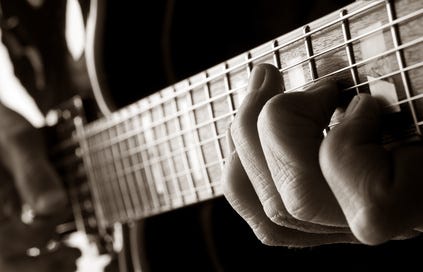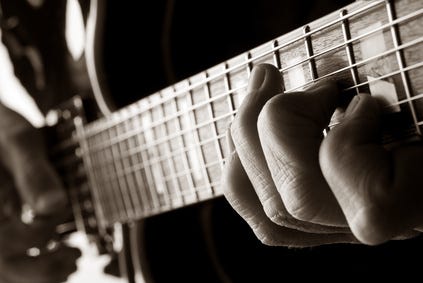Music from our youth recalls pivotal memories of a more idealistic self, ready to tackle the world’s challenges. When life seemed full of possibilities, a time of fire and passion that sometimes eludes us in our grown-up lives.
These soundtracks from adolescence and early adulthood provide solace, but also bittersweet reminders of our past vibrant selves.
As I commented previously, “Music speaks to us. It uplifts and energizes. Our heart sings when we hear our favorite song. Our bodies shudder. Our chests explode with joy or heartache.” Those emotions provide the glue for our values and perspective on the world. It’s no wonder that most religions enlist music to invoke a sense of spiritual awe.
In fact, music can arouse 13 subjective emotional reactions, according to researchers Alan Cowen and colleagues, including the following: “amusing, annoying, anxious/tense, beautiful, calm/relaxing/serene, dreamy, energizing/pump-up, erotic/desirous, indignant/defiant, joyful/cheerful, sad/depressing, scary/fearful, and triumphant/heroic.”
Immersion in music can evoke a feeling of flow, especially when the experience includes creative input through singing, dancing, songwriting, or performing. Flow is “a state in which people are so involved in an activity that nothing else seems to matter,” wrote positive psychology researcher Mihaly Csikszentmihalyi in his book, Flow: The Psychology of Optimal Experience. “The experience is so enjoyable that people will continue to do it even at great cost, for the sheer sake of doing it.”
Music also packs a powerful physiological punch, inducing physical changes such as variations in heart rate and respiration. Different types of music create an emotional impact that is felt in different parts of the body, such as the head, chest and limbs, according to researchers Vesa Putkinen and colleagues.
This makes sense. When music has a great beat, our feet tap to the rhythm. When music evokes sadness, it fills our chests with emotion. When it is calming, our muscles relax.
A timeline to youth
Music also provides an immediate connection to our past. Certain memorable songs or pieces let us revisit the exuberance and peak experiences that marked our developmental journey into adulthood. Music clarifies what is most meaningful, but also what brings us joy.
In “The secret joys of geriatric rock,” writer Tom Nichols describes the pleasure of attending a concert with a beloved band from his past. Unconstrained by decorum or concerns about sneers from younger folks, Nichols — along with the rest of the over 40’s crowd — could sing and sway to the music.
And while some may mock 70-year-old rock musicians parading about onstage, their music still evokes joy for the listener — even when the musicians’ aging bodies (and our own) are reminders that youth has passed us by.
A Complete Unknown
Music can be joyful, but also a reminder of values once held dear and what was (and still is) most meaningful.
In the biopic film “A Complete Unknown,” iconic singer/songwriter Bob Dylan is portrayed as elusive and brooding, yet oozing with talent. A genius at his craft and influencer for an entire generation, his impact is still relevant.
The film also highlights a different era when barriers and social conventions were challenged. The women’s movement, civil rights, LGBTQ rights, and opposition to a pointless war were central themes during the 1960s and changed how a generation viewed the world. (And despite its turmoil, the culture of the 1960s might seem an antidote to current times when billionaires call the shots and broadcast their privilege without compunction.)
As expected, mostly gray-haired and balding patrons populated the theater audience. Younger folks might view this film as historical drama, but are unlikely to experience any emotional resonance. They have their own musical memories to recall.
Whether you are 25 or 85, music lets you connect with the spunky idealist or dreamy empath that was your youthful self. Connecting with that hopeful, joyful, passionate, forward-thinking, and even rebellious younger self can enliven the present and remind you of core values that meant so much.
How does music invigorate you, bring you comfort, or recall memories from your youth? Please share your thoughts in the comments section below! Thanks.





Now I most definitely need to go see the film. Music is absolutely essential for my well-being!
What is music but vibration transmitted through substance? And perhaps the primary substance is air and its conveyance by breath. Physically, breath is the first and last act we perform as humans. And, as you note, in between those bookends, it can be a powerful expression of emotion, connection, and spirituality. It’s not surprising to find breathing at the center of a range of practices, from ancient meditation-based traditions to emerging techniques of modern psychology.
Two anecdotes come to mind.
My mom’s husband, who is also one of my (and many others’) great teachers, shuns modern therapy as well as spiritual practices. Yet, he is also a lifelong saxophone player (along with other wind instruments). I am convinced that his daily practice with this form of breathing has invaluably supported him in navigating the challenges of being human through his 98 years. I don’t believe he would have made it anywhere near this far without those horns and the community that exists around them.
As a kid, Simon and Garfunkel’s The Boxer spoke to me, with an arching emotion that vibrated into the depths my bones. Yet, I couldn’t reconcile the lyrics with my personal experiences. Why did I hold this intensely resonant connection? Just a few days ago, my partner spoke of my “jumping back into the arena of life, the boxing ring.” And it was in this moment I understood the transcendent message about which The Boxer speaks… “And he carries the reminders / Of every glove that laid him down”. None of us makes it through this life without wounds and scars. Yet we must find ways to carry on… sometimes running, sometimes hiding, sometimes fighting. “‘I am leaving, I am leaving’ / But the fighter still remains”